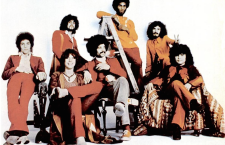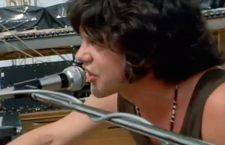His sound is so crystalline, so special, that Carlos Santana remains recognizable with or without pictures.
Yet for all of the accolades showered on this Mexican-born American guitar hero, not least of which is his inclusion in the Rock and Roll Hall of Fame, Santana has always been as bold and colorful as he is collaboratively brilliant. Greatest Hits: Live at Montreux, filmed last summer, tends to underscore how these intersections have come to define his band — and, in some cases, how dearly the original voices that joined Santana are missed.
One of the guitarist’s earliest, and still perhaps his most distinctive, FM-radio favorites was “Black Magic Woman,” written by Fleetwood Mac’s Peter Green and sung by original Santana band vocalist Gregg Rolie. A pair of singers in Tony Lindsay and Andy Vargas inhabit Rolie’s spot in the new film and, though they certainly prove to be energetic, neither brings the dark intrigue that made the original on 1970’s Abraxas such a dangerous wonder. Elsewhere, Santana revisits 1999’s “Smooth,” but his biggest hit single can’t achieve much momentum without its so-weird-it-worked guest vocalist Rob Thomas, then of Matchbox Twenty.
It’s little surprise, then, that Greatest Hits: Live at Montreux leaps to life when Santana welcomes a trio of special guests to the stage — beginning with his new bride, the talented drummer Cindy Blackmon. After she tears through “Corozon Espinado” and “Guajira” (from 1999’s Supernatural and 1971’s Santana III), Santana is later joined by the husband-and-wife blues rock tandem of Derek Tricks and Susan Tedeschi. Together, they reshape “Make Somebody Happy” from 1992’s Milagro, as well as “Right On Be Free” — a cover of an old Voices of East Harlem tune.
Santana’s spiritual connection with John Coltrane — something that memorably played out on 1974’s Illuminations with widow Alice Coltrane — is reflected here in a reference to the late saxophonist’s “A Love Supreme” on the second half of “Evil Ways.” In another tip of the hat to Santana’s passion for jazz, he opens this date with “Spark of the Divine,” the Sun Ra composition.
[SOMETHING ELSE! REWIND: Gregg Rolie discusses his Hall of Fame career as a founding member of Santana, a stint that saw Rolie co-produce the group’s first four albums beginning in 1969.]
Of course, that’s not to say every combination works — something that played out on a broad scale across Santana’s uneven 2010 tribute project Guitar Heaven. For every “Sunshine of Your Love,” a Cream-meets-Hendrix cut that fits Carlos’ style perfectly, you have a soulless meandering through AC/DC’s “Back in Black.” Santana is an ingredient so spice-filled and unique that it must be tempting to sprinkle it all over, just to see how the tastes will comingle. But he doesn’t go with everything.
Still, he gives it his all — from start to finish. Whatever the format, whatever the material, Santana performs with a molten intensity. Pillars of his legacy-building, deeply collaborative early bands like Rolie, Mike Carabello, José “Chepito” Areas and Michael Shrieve may be long gone, but the guitarist’s nervy ardor remains. He gets a powerful assist on Greatest Hits: Live at Montreux from a road-tested group featuring percussionists Raul Rekow and Karl Perazzo, bassist Benny Rietveld and drummer Dennis Chambers. Together, they provide a rumbling complexity to the full range of Santana’s music, no matter the vintage or relative power.
All of that allows Santana himself to move with thematic ease across the decades, tracing a career arc that’s shot past pan-African blues to polyrhythmic hippie-rock, stalled out in transcendental jazz and then restructured itself into something that combines Latin pop, metal and alt-rock. You have “Jingo,” “Evil Ways” and “Soul Sacrifice” from 1969’s Santana, performed with as much piss and vinegar as “Maria Maria” and “Foo Foo” — from Supernatural and 2002’s Shaman, respectively. There’s “Oye Como Va,” “Singing Winds, Crying Beasts,” and “Samba Pa Ti” from 1970’s Abraxas; but also “Into the Night” from 2007’s Ultimate Santana and “Europa (Earth’s Cry Heaven’s Smile)” from 1976’s Amigos. They reanimate “No One to Depend On,” from 1971’s Santana III, with a surprising force, too.
So, while Greatest Hits: Live at Montreux — due on February 21 from Eagle Rock — never quite rises to the point of being definitive, it nevertheless ends up being an often very entertaining journey anyway.
- Nick DeRiso’s Best of 2015 (Rock + Pop): Death Cab for Cutie, Joe Jackson, Toto + Others - January 18, 2016
- Nick DeRiso’s Best of 2015 (Blues, Jazz + R&B): Boz Scaggs, Gavin Harrison, Alabama Shakes - January 10, 2016
- Nick DeRiso’s Best of 2015 (Reissues + Live): John Oates, Led Zeppelin, Yes, Faces + others - January 7, 2016



